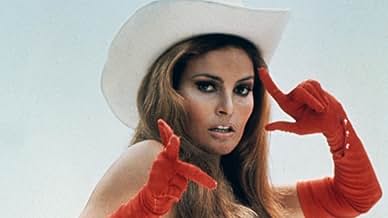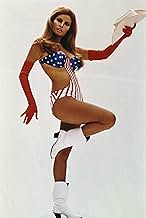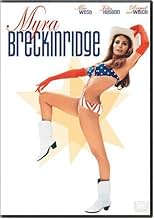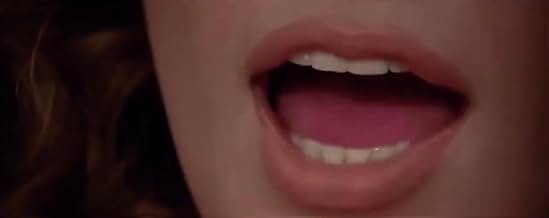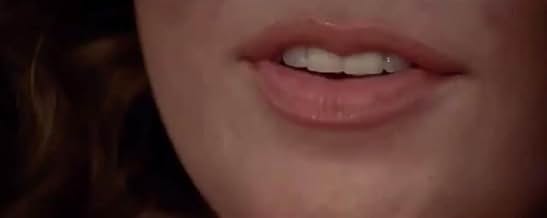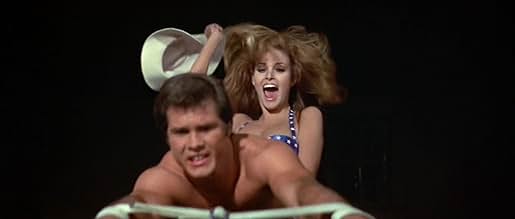VALUTAZIONE IMDb
4,5/10
3625
LA TUA VALUTAZIONE
Dopo aver subito un intervento chirurgico per cambiare sesso, un'aspirante attrice si reca a Hollywood, dove vuole anche rivendicare la proprietà del suo ricco zio.Dopo aver subito un intervento chirurgico per cambiare sesso, un'aspirante attrice si reca a Hollywood, dove vuole anche rivendicare la proprietà del suo ricco zio.Dopo aver subito un intervento chirurgico per cambiare sesso, un'aspirante attrice si reca a Hollywood, dove vuole anche rivendicare la proprietà del suo ricco zio.
- Regia
- Sceneggiatura
- Star
Robert P. Lieb
- Charlie Flager, Sr.
- (as Robert Lieb)
Recensioni in evidenza
I read "Myra Breckinridge" in 1969 when I was riding a bus from St. Louis to San Antonio, and I fell in love with everything about the book. I saw the movie when it first came out (even though I was not, legally, old enough) and had a blast. This film (I do NOT use that term loosely) had so much going on and not going on between pretty people and not so pretty people who were acting badly and beautifully while doing evil and funny and disgusting and sweet things to each other in the most vicious and caring ways possible, I was overwhelmed by it all. It had more to say in its heaving breast about the cruel and elevated ways in which man treats his fellow man than every Oscar-winning picture since...and all while telling its story in the most absurd and drug-inducing manner possible.
But what adds even more to the meaning of the film is how it destroyed the career of not just its director (who probably deserved it) but also ruined any chance of a career for Roger Herren solely because he played a character who was raped by a woman. Men can play rapists and women can be raped and gang raped and even play lesbians, and they receive Oscars for their performances and no one thinks the worst of them. But let a man get sodomized and suddenly everyone questions his masculinity and ability to relate to the opposite sex. And THAT is where MYRA BRECKINRIDGE stands tall.
Yes, the movie is a smash-up of styles and insane casting choices and baldly ludicrous dialogue and unintentionally funny acting, but so were more recent idiot movies like THE ROCK and TITANIC and SHAKESPEARE IN LOVE, and look how successful they became...and how quickly they will be forgotten. At least MYRA BRECKINRIDGE, the movie (maybe even moreso than the book), worked as a slap in the face of America's sexual dysfunction and hypocrisy...and I believe THAT is what bothers so many people about it. And that is why it remains a movie worth watching,
But what adds even more to the meaning of the film is how it destroyed the career of not just its director (who probably deserved it) but also ruined any chance of a career for Roger Herren solely because he played a character who was raped by a woman. Men can play rapists and women can be raped and gang raped and even play lesbians, and they receive Oscars for their performances and no one thinks the worst of them. But let a man get sodomized and suddenly everyone questions his masculinity and ability to relate to the opposite sex. And THAT is where MYRA BRECKINRIDGE stands tall.
Yes, the movie is a smash-up of styles and insane casting choices and baldly ludicrous dialogue and unintentionally funny acting, but so were more recent idiot movies like THE ROCK and TITANIC and SHAKESPEARE IN LOVE, and look how successful they became...and how quickly they will be forgotten. At least MYRA BRECKINRIDGE, the movie (maybe even moreso than the book), worked as a slap in the face of America's sexual dysfunction and hypocrisy...and I believe THAT is what bothers so many people about it. And that is why it remains a movie worth watching,
Seldom seen since theatrical release in 1970, MYRA BRECKINRIDGE has become a byword for cinematic debacles of legendary proportions. Now at last on DVD in an unexpectedly handsome package, it is as unlikely to win wide audiences today as it was when first released.
Gore Vidal's 1968 bestseller was a darkly satirical statement. Most filmmakers felt that the novel's story, structure, and overall tone would not translate to film, and industry insiders were surprised when 20th Century Fox not only acquired the rights but also hired Vidal to adapt his novel to the screen. But studio executives soon had cold feet: Vidal's adaptations were repeatedly rejected and novice writer-director Michael Sarne was brought in to bring the film to the screen.
Studio executives hoped that Sarne would tap into the youth market they saw as a target for the film, but Sarne proved even more out of synch with the material than the executives themselves. Rewrite upon rewrite followed. The cast, sensing disaster, became increasingly combative. In her DVD commentary, star Raquel Welch says that she seldom had any idea of what Myra's motives were from scene to scene or even within any single scene itself, and that each person involved seemed to be making an entirely different film. In the accompanying "Back Story" documentary, Rex Reed says that MYRA BRECKINRIDGE was a film made by a bunch of people who hid in their dressing rooms while waiting for their lawyers to return their calls.
The accuracy of these comments are demonstrated by the film itself. The basics of Vidal's story are there, but not only has the story been shorn of all broader implications, it seems to have no point in and of itself. Everything runs off in multiple directions, nothing connects, and numerous scenes undercut whatever logic previous scenes might have had. And while director Sarne repeatedly states in his commentary that he wanted to make the film as pure farce, the only laughs generated are accidental.
Chief among these accidents is Mae West. It is true that West is unexpectedly well preserved in appearance and that she had lost none of her way with a one-liner--but there is no getting around the fact that she is in her seventies, and her conviction that she is the still the sexiest trick in shoe leather is extremely unsettling, to say the least. But worse, really, is the fact that West is outside her era. Her efforts to translate herself into a hip and happening persona results in one of the most embarrassing self-caricatures ever seen on film.
The remaining cast is largely wasted. Raquel Welch, a significantly underestimated actress, plays the title role of Myra very much like a Barbie doll on steroids; non-actor Rex Reed is unexpectedly effective in the role of Myron, but the entire role is essentially without point. Only John Huston and cameo players John Carradine, Jim Backus, William Hopper, and Andy Devine emerge relatively unscathed. Yes, it really is the debacle everyone involved in the film feared it would be: fast when it should be slow, slow when it should be fast, relentlessly unfunny from start to finish. It is true that director Sarne does have the occasional inspired idea--as in his use of film clips of everyone from Shirley Temple to Judy Garland to create counterpoint to the action--but by and large, whenever Sarne was presented with a choice of how to do something he seems to have made the wrong one.
The how and why of that is made clear in Sarne's audio commentary. Sarne did not like the novel or, for that matter, the subject matter in general. He did not want to write the screenplay, but he needed the money; he emphatically did not want to direct the film, but he need the money. He makes it very clear that he disliked author Gore Vidal and Rex Reed (at one point he flatly states that Reed "is not a nice person"), and to this day he considers that Vidal and Reed worked in tandem to sabotage the film because he refused to play into their 'homosexual agenda'--which, when you come right down to it, seems to have been their desire that Sarne actually film Vidal's novel rather than his own weirdly imagined take-off on it.
Although he spends a fair amount of commentary time stating that the film is widely liked by the gay community, Sarne never quite seems to understand that the appeal of the film for a gay audience arises from his ridiculously inaccurate depiction of homosexual people. When taken in tandem with the film itself, Sarne emerges as more than a little homophobic--and quite frankly the single worst choice of writers and directors that could have been made for this project.
In addition to the Sarne and Welch commentaries and the making-of documentary, the DVD release includes several trailers and two versions of the film: a "theatrical release" version and a "restored" version. The only difference between the two is that the final scene in the "restored" version has been printed to black and white. The edits made before the film went into general release have not been restored, but the documentary details what they were. The widescreen transfers of both are remarkably good and the sound is quite fine. But to end where I began, this is indeed a film that will most interest film historians, movie buffs, and cult movie fans. I give it three out of five stars for their sake alone, but everyone else should pass it by.
Gary F. Taylor, aka GFT, Amazon Reviewer
Gore Vidal's 1968 bestseller was a darkly satirical statement. Most filmmakers felt that the novel's story, structure, and overall tone would not translate to film, and industry insiders were surprised when 20th Century Fox not only acquired the rights but also hired Vidal to adapt his novel to the screen. But studio executives soon had cold feet: Vidal's adaptations were repeatedly rejected and novice writer-director Michael Sarne was brought in to bring the film to the screen.
Studio executives hoped that Sarne would tap into the youth market they saw as a target for the film, but Sarne proved even more out of synch with the material than the executives themselves. Rewrite upon rewrite followed. The cast, sensing disaster, became increasingly combative. In her DVD commentary, star Raquel Welch says that she seldom had any idea of what Myra's motives were from scene to scene or even within any single scene itself, and that each person involved seemed to be making an entirely different film. In the accompanying "Back Story" documentary, Rex Reed says that MYRA BRECKINRIDGE was a film made by a bunch of people who hid in their dressing rooms while waiting for their lawyers to return their calls.
The accuracy of these comments are demonstrated by the film itself. The basics of Vidal's story are there, but not only has the story been shorn of all broader implications, it seems to have no point in and of itself. Everything runs off in multiple directions, nothing connects, and numerous scenes undercut whatever logic previous scenes might have had. And while director Sarne repeatedly states in his commentary that he wanted to make the film as pure farce, the only laughs generated are accidental.
Chief among these accidents is Mae West. It is true that West is unexpectedly well preserved in appearance and that she had lost none of her way with a one-liner--but there is no getting around the fact that she is in her seventies, and her conviction that she is the still the sexiest trick in shoe leather is extremely unsettling, to say the least. But worse, really, is the fact that West is outside her era. Her efforts to translate herself into a hip and happening persona results in one of the most embarrassing self-caricatures ever seen on film.
The remaining cast is largely wasted. Raquel Welch, a significantly underestimated actress, plays the title role of Myra very much like a Barbie doll on steroids; non-actor Rex Reed is unexpectedly effective in the role of Myron, but the entire role is essentially without point. Only John Huston and cameo players John Carradine, Jim Backus, William Hopper, and Andy Devine emerge relatively unscathed. Yes, it really is the debacle everyone involved in the film feared it would be: fast when it should be slow, slow when it should be fast, relentlessly unfunny from start to finish. It is true that director Sarne does have the occasional inspired idea--as in his use of film clips of everyone from Shirley Temple to Judy Garland to create counterpoint to the action--but by and large, whenever Sarne was presented with a choice of how to do something he seems to have made the wrong one.
The how and why of that is made clear in Sarne's audio commentary. Sarne did not like the novel or, for that matter, the subject matter in general. He did not want to write the screenplay, but he needed the money; he emphatically did not want to direct the film, but he need the money. He makes it very clear that he disliked author Gore Vidal and Rex Reed (at one point he flatly states that Reed "is not a nice person"), and to this day he considers that Vidal and Reed worked in tandem to sabotage the film because he refused to play into their 'homosexual agenda'--which, when you come right down to it, seems to have been their desire that Sarne actually film Vidal's novel rather than his own weirdly imagined take-off on it.
Although he spends a fair amount of commentary time stating that the film is widely liked by the gay community, Sarne never quite seems to understand that the appeal of the film for a gay audience arises from his ridiculously inaccurate depiction of homosexual people. When taken in tandem with the film itself, Sarne emerges as more than a little homophobic--and quite frankly the single worst choice of writers and directors that could have been made for this project.
In addition to the Sarne and Welch commentaries and the making-of documentary, the DVD release includes several trailers and two versions of the film: a "theatrical release" version and a "restored" version. The only difference between the two is that the final scene in the "restored" version has been printed to black and white. The edits made before the film went into general release have not been restored, but the documentary details what they were. The widescreen transfers of both are remarkably good and the sound is quite fine. But to end where I began, this is indeed a film that will most interest film historians, movie buffs, and cult movie fans. I give it three out of five stars for their sake alone, but everyone else should pass it by.
Gary F. Taylor, aka GFT, Amazon Reviewer
A man who wishes to become a woman wants to show the world that men are not the superior beings that they have been made out to be. To in fact do to men what men have been doing to women since the beginning of time. Is it surprising that this film is despised by so many people - especially men? The fact that this film is so threatening is a good sign that it is right on track. A handsome idiot "stud", an over-the-hill sexist cowboy wannabe and a whole stable of dumb gorgeous guys (including Tom Selleck!) show what all those fun, sexist sixties movies look like in the mirror image. For here it is the women (Myra and an elderly Mae West) who throw out the sexist innuendo and treat men like fresh meat that have little value other than what they can offer women with their bodies. The sight of an unattractive and elderly Mae West always gets the shaft by the film's critics, yet they rarely comment on the appearance of her male counterpart (played with great relish by John Huston) who also seduces (and I might add verbally abuses) women one-third his age. Hmmm. The fact that this film is so hated shows how far men still have to go before opening up their minds and really seeing the double standards that they adhere to when it comes to sex comedies. It's only when the tables are turned that one can truly perceive this - and this film does this beautifully. It is after all a satire and commentary on Hollywood (as well as on the cheesy camp classics from everyone from Roger Corman to Russ Meyer). The interspersing of classic Hollywood movies depicting this seems to have eluded many viewers since they're so used to taking such images for granted. They don't question them or even see what those classic images are really projecting.
Anyway, this is the most brilliant example of camp cinema to date. The hilarious sabotaging of scenes with reaction shots from various movie stars reflects the so-called innocence of the audience (no wonder so many people find that uncomfortable!), and the film is also choked full of famous faces parodying the very images that made them famous. It has all the camp and surreal qualities of Gore Vidal's book, and it retains most of his incredible dialogue. It is also one of the best movies about Hollywood and the jerks who work there. And last but not least, Raquel Welsh should be most proud of her performance. I cannot imagine anyone else in this role because she is not only wonderful, she completely turns the tables on the stereotypes she personified to men throughout her career. She was a wonderfully cheesy sex goddess, and here she finally has a chance to ahem, be in the driver's seat. It's all just in fun, and that's what the movie is saying. If treating women like they are just a pair of boobs is entertainment, then why can't treating men like they are just a pair of bullocks be the same?
Anyway, this is the most brilliant example of camp cinema to date. The hilarious sabotaging of scenes with reaction shots from various movie stars reflects the so-called innocence of the audience (no wonder so many people find that uncomfortable!), and the film is also choked full of famous faces parodying the very images that made them famous. It has all the camp and surreal qualities of Gore Vidal's book, and it retains most of his incredible dialogue. It is also one of the best movies about Hollywood and the jerks who work there. And last but not least, Raquel Welsh should be most proud of her performance. I cannot imagine anyone else in this role because she is not only wonderful, she completely turns the tables on the stereotypes she personified to men throughout her career. She was a wonderfully cheesy sex goddess, and here she finally has a chance to ahem, be in the driver's seat. It's all just in fun, and that's what the movie is saying. If treating women like they are just a pair of boobs is entertainment, then why can't treating men like they are just a pair of bullocks be the same?
Somebody once said that Gore Vidal's novel "Myra Breckinridge" was un-filmable to begin with. That's probably true. One scene in the book--- a female-on-male rape, described in nauseating, horrific detail--- would have sent most movie directors scurrying in the opposite direction. There's no way that this story could have ever become a classic mainstream movie. But it's not all that bad, thanks mostly to some really clever casting (bringing Mae West into the film was a stroke of genius) and a wonderful, bitingly funny and dead-on performance by a young Raquel Welch.
The basic story is a *really* bizarre dark comedy involving a guy, Myron Breckinridge (Rex Reed), who has sex-change surgery--- or does he, really?--- to become his alter-ego Myra (Raquel Welch). As a female, Myra tries to shake down her uncle Buck Loner (John Huston) into giving her at least half of his popular acting school. There are a few side stories along the way, involving Mae West as a sex-mad Hollywood agent, Farrah Fawcett as a sunny-smiling dumb blonde, and Roger Herron as handsome young Rusty-the-Stud, who ends up being nothing much more than a boy-toy (both in the film and in real life. Was he *ever* heard from again after appearing in this movie?)
The theme of this movie is "Hollywood" in great big letters. A fascination with the movie industry runs through it. It's about everything we imagine Hollywood to be: actors, agents, Southern California, limousines, wild sex, drugs, nudity, the whole bit. There are references to, film clips of, and appearances by, classic Hollywood movies and stars. If you aren't interested in Hollywood and what it represents--- or used to represent--- forget this movie. You won't like it. That's what it's about.
The fun (and there is some) lies in the cynical mechanisms of nearly all the leading players. Well, all except Farrah Fawcett, that is; her wide smile and big teeth, years before "Charlie's Angels", is all happy sincerity; this girl doesn't have a cynical bone in her body. You can't help but like her).
Plopped directly into the middle of various scenes, often with no purpose whatsoever but to add "mood", are dozens of film clips from old 20th-Century-Fox movies. The inclusion of these off-the-wall clips give the whole movie a slightly off-center, psychedelic feel that must have felt self-knowingly hip in the late 1960s and early 1970s.
Two big highlights in this movie: the performances of Raquel Welch and Mae West. West got top billing, but is actually seen in a *very* small role; maybe 10 minutes of total screen time. Her scenes are completely self-contained; they don't have much to do with the rest of the movie (except in mood and style), but they are great fun to watch. I'm really shocked by all of the negative comments about her by other reviewers. They aren't giving her enough credit, because West was *hilariously* funny at the mind-boggling age of 77 when she made this movie. Most of the time, she seems easily 30 years younger. (Only for one brief scene in the back seat of a limo--- where she looks quite weary--- does it seem even possible this woman might be on the far side of elderly).
West may have been in her late 70s here, but her character was definitely not. She's playing a hip, powerful, horny, dynamic, middle-aged foxy chick, and damn if she doesn't pull it off with aplomb and style. It would be an impossible role for any other woman of her age, but she did it so successfully that you don't realize what an accomplishment it was until you think about it. West alone is worth the price of admission--- or the price of the DVD, anyway.
Raquel Welch was also at the very top of her form here. An absolute knockout to look at, Welch was drop-dead gorgeous, and she gives a biting, sarcastic, and also hilariously funny performance as Myra. She, by the way, *is* the leading role, despite Mae West getting top billing. The two women did not get at all along during filming, by the way, and in their one scene together, it's obvious that they were never filmed at the same time; their dialogue consists entirely of close-ups of each lady separately.
This movie tried, maybe a little too hard, to be hip and "adult" at the time, and so it's got some needlessly raunchy language and situations in it (including the afore-mentioned female-on-male rape which, unfortunately, did make it into the movie. It's almost as horrific as reading about it in the book was, and you have to feel sorry for Roger Herron as Rusty, the object of Myra's ugly power fantasy.) It was awfully hard to even put a story like this on film in the first place, but Michael Sarne did try, and he succeeded more than failed. I think it's worth it. But know what you're in for when you watch it!
The basic story is a *really* bizarre dark comedy involving a guy, Myron Breckinridge (Rex Reed), who has sex-change surgery--- or does he, really?--- to become his alter-ego Myra (Raquel Welch). As a female, Myra tries to shake down her uncle Buck Loner (John Huston) into giving her at least half of his popular acting school. There are a few side stories along the way, involving Mae West as a sex-mad Hollywood agent, Farrah Fawcett as a sunny-smiling dumb blonde, and Roger Herron as handsome young Rusty-the-Stud, who ends up being nothing much more than a boy-toy (both in the film and in real life. Was he *ever* heard from again after appearing in this movie?)
The theme of this movie is "Hollywood" in great big letters. A fascination with the movie industry runs through it. It's about everything we imagine Hollywood to be: actors, agents, Southern California, limousines, wild sex, drugs, nudity, the whole bit. There are references to, film clips of, and appearances by, classic Hollywood movies and stars. If you aren't interested in Hollywood and what it represents--- or used to represent--- forget this movie. You won't like it. That's what it's about.
The fun (and there is some) lies in the cynical mechanisms of nearly all the leading players. Well, all except Farrah Fawcett, that is; her wide smile and big teeth, years before "Charlie's Angels", is all happy sincerity; this girl doesn't have a cynical bone in her body. You can't help but like her).
Plopped directly into the middle of various scenes, often with no purpose whatsoever but to add "mood", are dozens of film clips from old 20th-Century-Fox movies. The inclusion of these off-the-wall clips give the whole movie a slightly off-center, psychedelic feel that must have felt self-knowingly hip in the late 1960s and early 1970s.
Two big highlights in this movie: the performances of Raquel Welch and Mae West. West got top billing, but is actually seen in a *very* small role; maybe 10 minutes of total screen time. Her scenes are completely self-contained; they don't have much to do with the rest of the movie (except in mood and style), but they are great fun to watch. I'm really shocked by all of the negative comments about her by other reviewers. They aren't giving her enough credit, because West was *hilariously* funny at the mind-boggling age of 77 when she made this movie. Most of the time, she seems easily 30 years younger. (Only for one brief scene in the back seat of a limo--- where she looks quite weary--- does it seem even possible this woman might be on the far side of elderly).
West may have been in her late 70s here, but her character was definitely not. She's playing a hip, powerful, horny, dynamic, middle-aged foxy chick, and damn if she doesn't pull it off with aplomb and style. It would be an impossible role for any other woman of her age, but she did it so successfully that you don't realize what an accomplishment it was until you think about it. West alone is worth the price of admission--- or the price of the DVD, anyway.
Raquel Welch was also at the very top of her form here. An absolute knockout to look at, Welch was drop-dead gorgeous, and she gives a biting, sarcastic, and also hilariously funny performance as Myra. She, by the way, *is* the leading role, despite Mae West getting top billing. The two women did not get at all along during filming, by the way, and in their one scene together, it's obvious that they were never filmed at the same time; their dialogue consists entirely of close-ups of each lady separately.
This movie tried, maybe a little too hard, to be hip and "adult" at the time, and so it's got some needlessly raunchy language and situations in it (including the afore-mentioned female-on-male rape which, unfortunately, did make it into the movie. It's almost as horrific as reading about it in the book was, and you have to feel sorry for Roger Herron as Rusty, the object of Myra's ugly power fantasy.) It was awfully hard to even put a story like this on film in the first place, but Michael Sarne did try, and he succeeded more than failed. I think it's worth it. But know what you're in for when you watch it!
Quite how this became Hollywood's most famously reviled and ridiculed creation is almost as mysterious as how such a bizarre film was ever made in the first place.
It's the story of a gay film critic knocked unconscious in a car accident who then dreams he has undergone a sex-change operation and been recreated in Raquel Welch's image. I managed to work that much out after two viewings, the first wondering what the hell I was seeing and the second spotting the few clues to the "plotline" that exist between the scenes of insane camp and bizarre sexual acts.
Somehow, through all the confusion and early '70s delirium, I found myself enjoying it. It is a ridiculous mess, but where else are you going to see the legendary John Huston receiving a brutal Swedish massage and Raquel Welch in glorious widescreen, Technicolor Panavision wearing a strap-on and cowgirl outfit ensemble? Not in Legally Blonde, I know that much.
It's the story of a gay film critic knocked unconscious in a car accident who then dreams he has undergone a sex-change operation and been recreated in Raquel Welch's image. I managed to work that much out after two viewings, the first wondering what the hell I was seeing and the second spotting the few clues to the "plotline" that exist between the scenes of insane camp and bizarre sexual acts.
Somehow, through all the confusion and early '70s delirium, I found myself enjoying it. It is a ridiculous mess, but where else are you going to see the legendary John Huston receiving a brutal Swedish massage and Raquel Welch in glorious widescreen, Technicolor Panavision wearing a strap-on and cowgirl outfit ensemble? Not in Legally Blonde, I know that much.
Lo sapevi?
- QuizIt was Lee Majors who got then-girlfriend Farrah Fawcett involved in this movie. He was sought for the role of Rusty but turned it down. However, he did introduce the producers to Fawcett, who had done several television commercials by that time, and she was hired to play Mary Ann. She later told Rona Barrett, "It was a terrible picture. But it taught me a lot about egos and star-trips. Everyone was on that!"
- BlooperApparently pieced together from different takes, Myra's blouse collar alternately appears fully outside, partially inside/outside and fully outside her jacket while she "depantses" Rusty in her office.
- Versioni alternativeOriginally rated "X" when released in 1970. In 1978 the film edited to be re-rated "R".
- ConnessioniEdited from La nave di satana (1935)
- Colonne sonoreSecret Place
Music by John Phillips
Lyrics by John Phillips
Sung by Rex Reed (uncredited)
[Also sung by off-screen vocal group]
I più visti
Accedi per valutare e creare un elenco di titoli salvati per ottenere consigli personalizzati
- How long is Myra Breckinridge?Powered by Alexa
Dettagli
- Data di uscita
- Paese di origine
- Lingue
- Celebre anche come
- Myra Breckinridge
- Luoghi delle riprese
- 6914 Hollywood Boulevard, Hollywood, Los Angeles, California, Stati Uniti(Myron and Myra dancing on the street, Ann Miller's star on the Hollywood Walk of Fame)
- Azienda produttrice
- Vedi altri crediti dell’azienda su IMDbPro
Botteghino
- Budget
- 5.385.000 USD (previsto)
- Tempo di esecuzione1 ora 34 minuti
- Colore
- Proporzioni
- 2.35 : 1
Contribuisci a questa pagina
Suggerisci una modifica o aggiungi i contenuti mancanti

Divario superiore
By what name was Il caso Myra Breckinridge (1970) officially released in India in English?
Rispondi

